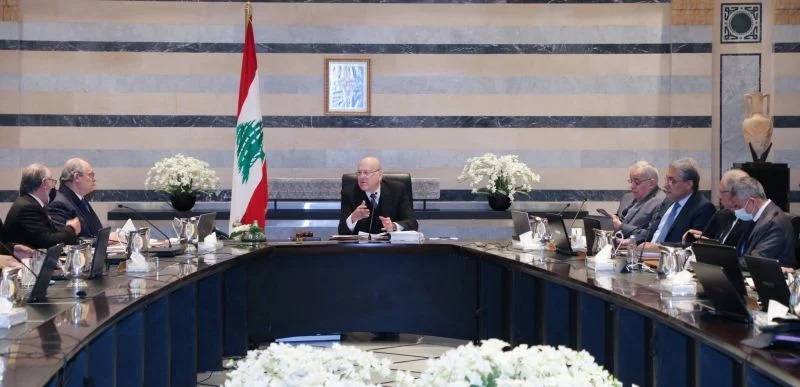
Najib Mikati's government meets on January 26 at the Grand Serail. (Credit: Dalati and Nohra)
BEIRUT — Cabinet met Thursday at the Grand Serail for less than two hours to discuss a 21-item agenda, which included discussions of the recent backlash around the leaked economic plan.
Here’s what we know:
• Earlier this week, the main points of the government economic recovery plan, which is part of a preliminary agreement with the International Monetary Fund, were leaked to the press. The plan’s details drew widespread criticism.
• “It is expected that the economic recovery plan will be adopted before the parliamentary elections because time is running out,” Information Minister Ziad Makari said in response to reporters' questions after the cabinet meeting.
• This recovery plan is supposed to be part of the preliminary agreement concluded recently by the government with the IMF in an attempt to reach an agreement on financial assistance of $3 billion over four years, conditional on serious reforms. The plan stresses the need for Parliament to pass a law restructuring the banking sector, another introducing formal capital controls and a third adjusting banking secrecy legislation.
• “Linking the capital control [law] to the protection of [bank] deposits is a mistake. Capital control should have been introduced at the beginning of the financial crisis,” the prime minister said as the cabinet meeting started. “For us to be able to present an economic recovery plan, we must take this step so that the money stays in Lebanon,” Mikati added.
• Mikati went on to say that the IMF “has called for a vote on a budget, the establishment of capital controls, [lifting] bank secrecy and the restructuring of banks.” “We cannot achieve a recovery without adopting these measures in full transparency,” Mikati warned. He also said that the recovery plan “has not been approved by the cabinet,” adding, “We have been clear on this point and we are awaiting the ministers’ comments and opinions on the document. We sent the text yesterday to Parliament so that MPs can only consult it and formulate their comments.”
• Parliamentary committees met yesterday to discuss a recent draft of a capital control law. Angry demonstrations were taking place near Parliament where the law was discussed at the same time in protest of the new version of the capital control law. Parliament Speaker Nabih Berri scheduled a new meeting for the parliamentary committees next Tuesday to discuss the capital control law.
• According to L’Orient Today’s correspondent at the Grand Serail, cabinet did not make any progress during the session regarding strategies to secure wheat imports in light of disruptions caused by the Russian invasion of Ukraine. Lebanon imports around 60 percent of its wheat from Ukraine. In recent weeks, concerns over wheat supplies have caused many bread buyers to panic buy at bakeries. In its last meeting, the cabinet decided to allocate $15 million of its IMF Special Drawing Rights for wheat imports.
• “I requested an additional $21 million so that we can ensure the quantities of wheat necessary for the next seven to eight months are secured, but this was not approved,” Economy Minister Amin Salam told L'Orient Today’s correspondent at the Grand Serail after the meeting. Salam however affirmed that the authorities “do not intend to lift subsidies on bread.”
• On the Jordanian fuel deal, Energy Minister Walid Fayad, told the media before the meeting that “an agreement has been reached and we have done our duty, but there is a delay in financing. But this financing was not turned down.” Fayad said that “the ball is in the court of the American administration and the World Bank.”
• Health Minister Firass Abiad, indicated following the session that LL14 billion from the reserves of the budget have been transferred to his ministry for the benefit of government hospitals. The public health sector is going through a serious crisis as the country suffers from an unprecedented economic collapse that coincided with the COVID-19 pandemic, putting further pressure on the sector.